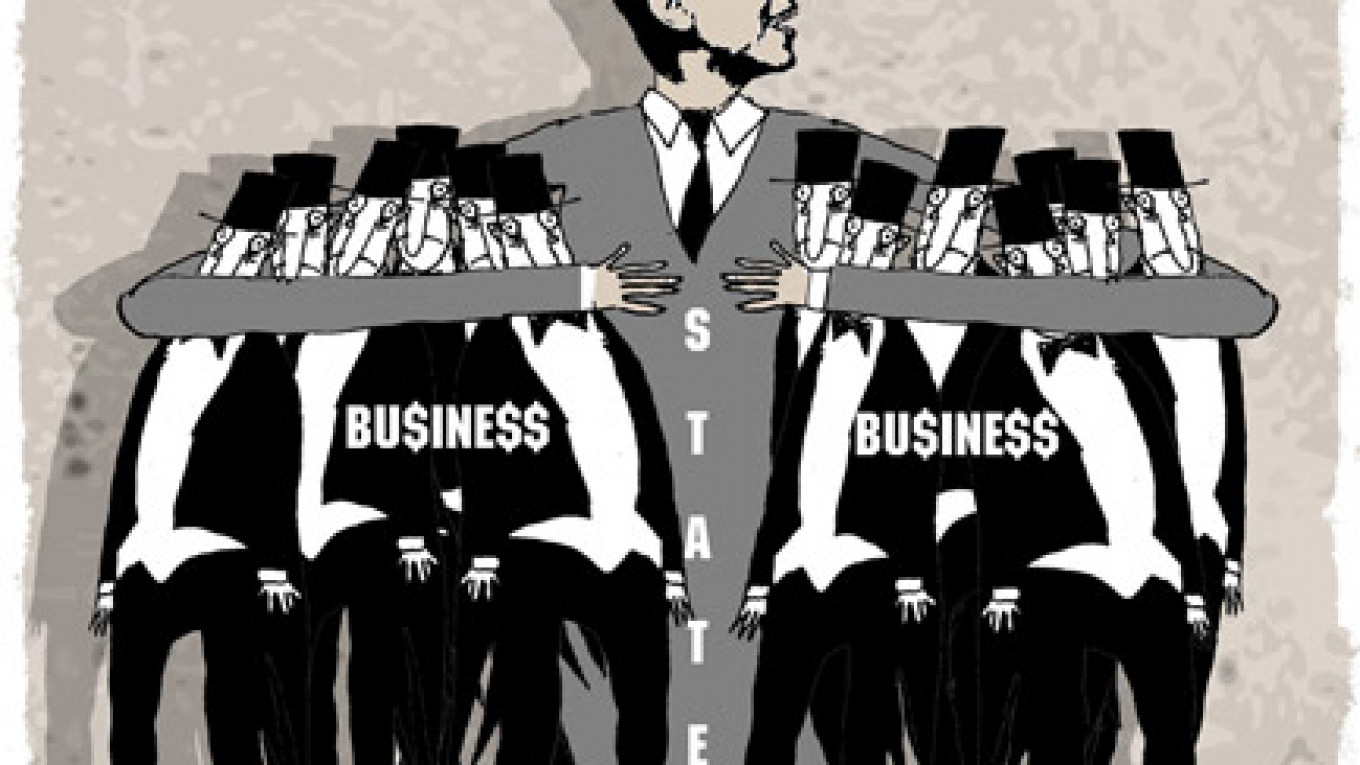At a meeting with the Association of European Businesses in Russia on Oct. 14, Foreign Minister Sergei Lavrov advised the members to actively defend their rights before their respective governments. "If you are willing to follow political orders and put up with a certain degree of loss, that is your choice. But otherwise, you should lobby your interests, as is done during ordinary times, and even more so during difficult times. Business must clearly set out its interests and intentions," he said.
Traditionally, the exact opposite is true in Russia, where the state's interests always outweigh private interests. However, Western sanctions have had a significant impact on economic ties between Russia and the European Union, and a closer look at the relationship between the state and business in the modern world reveals some interesting trends.
On Sept. 18, the SWIFT financial communications system, which handles most of the world's banking transactions, issued a statement responding to a European Parliament resolution to exclude Russia from the system due to the country's position on Ukraine.
"The singling-out of SWIFT in this manner interferes disproportionately with SWIFT's fundamental right to conduct business and its right to property," the statement read. "It also constitutes discriminatory and unequal treatment. Explicitly mentioning SWIFT in a European Parliament resolution of this kind on such an international sensitive matter also creates immense damage to our company's reputation."
This was probably the first instance since the imposition of sanctions that a business firmly rejected politically motivated pressure. Back in March, both Visa and MasterCard obediently complied with the White House demand to expel four Russian banks from their payment systems.
Major European and U.S. companies that are suffering losses or worsening relations with their Russian partners due to the sanctions grumble about government policy but have not mounted any organized resistance.
But SWIFT toned down its rhetoric in another statement issued on Oct. 6.
"Services are designed to facilitate customers' compliance with sanctions and other regulations, however SWIFT will not make unilateral decisions to disconnect institutions from its network as a result of political pressure. … Any decision to impose sanctions on countries or individual entities rests solely with the competent government bodies and applicable legislators. Being EU-based, SWIFT complies fully with all applicable European law."
In May, representatives of the largest U.S. companies privately complained about an unprecedented situation. It seems that senior U.S. administration officials phoned the executive directors of private corporations and strongly urged them not to attend the St. Petersburg Economic Forum.
According to members of the business community, that type of strong-armed approach was a first in U.S. government-business relations. Officials had previously used a more nuanced, indirect approach in their communications.
In this case, the pressure tactic by senior officials was not entirely successful, but it did go a long way toward worsening the mood among U.S. businesses working with Russia. Of course, the situation has grown dramatically worse since then.
An even more telling example is Germany, where the political model reflects the close relationship between big business and the federal government. From as far back as the 1950s, the interests of German industrialists have been a major, if not determining, factor in that country's policy toward Eastern states.
Many observers anticipated that the needs of the German business community — for whom Russia is a key market and a source of raw materials — would dampen the political pressure and lessen the severity of the sanctions. And that did happen initially, but as the Ukrainian crisis escalated and the German authorities took an increasingly tough stance against Moscow, the business community grew less vociferous.
German leaders explained to their capitalists that the political stakes were too high now, and that their interests would not receive the same high priority. And so, the German business community has accepted that reality — at least for now.
What is happening? Is this an isolated case or is a pattern emerging? In fact, evidence suggests that this is the beginning of a trend. One of the leaders of a major U.S. business association recently told me that U.S. President Barack Obama imposed these costly restrictions on business as part of a strategy to rein in the corporations that he has treated with hostility from the very start.
That might be an exaggeration, but recall that Obama came to the presidency in 2008 riding on a wave of widespread and intense hatred of "the greed of Wall Street." What's more, many observers consider Obama to have the most leftist economic policy of all presidents in U.S. history.
The world is undergoing a transformation that applies to virtually all aspects of political and economic life, and the relationship between the state and the private sector is no exception. A little-noticed revolution took place at the turn of the century when the balance of ownership in the raw material sector — so critical to global development — shifted away from private transnational companies to government monopolies, whether in the Arab world, Venezuela or Russia.
With the growing undercurrent of instability and severe pressure from the West, the Russian government has only further consolidated its control.
Then everyone spoke of a phenomenon dubbed "authoritarian capitalism" as personified by China and, to a lesser extent, Russia. Observers claimed that such systems can rapidly reach decisions with little discussion, enabling them to outpace democracies that become mired down in debate. However, this topic has always sparked a great deal of controversy because the label of "authoritarian capitalism" is applied too indiscriminately.
But in the late 2000s, at the height of the global financial crisis that exposed the destructive side of all-powerful markets, even the West began to completely re-evaluate the role of government in the economy. The neoliberal dogma that had generally dominated since the 1980s was no longer seen as an absolute truth and the search began for a new balance between the free market and government regulation.
The current sanctions increase the authority of state institutions, with political agendas clearly eclipsing rational economic considerations. If this process continues, it could exert a powerful impact on the overall design of the global economic and political system.
However, there is another side to this issue. State governments are primarily occupied with spending and allocating funds, not with generating wealth. And if businesses are wholly subjugated to the will of politicians, it is unclear where leaders will find the money they need for spending and allocating.
Fyodor Lukyanov is editor of Russia in Global Affairs.
A Message from The Moscow Times:
Dear readers,
We are facing unprecedented challenges. Russia's Prosecutor General's Office has designated The Moscow Times as an "undesirable" organization, criminalizing our work and putting our staff at risk of prosecution. This follows our earlier unjust labeling as a "foreign agent."
These actions are direct attempts to silence independent journalism in Russia. The authorities claim our work "discredits the decisions of the Russian leadership." We see things differently: we strive to provide accurate, unbiased reporting on Russia.
We, the journalists of The Moscow Times, refuse to be silenced. But to continue our work, we need your help.
Your support, no matter how small, makes a world of difference. If you can, please support us monthly starting from just $2. It's quick to set up, and every contribution makes a significant impact.
By supporting The Moscow Times, you're defending open, independent journalism in the face of repression. Thank you for standing with us.
Remind me later.








